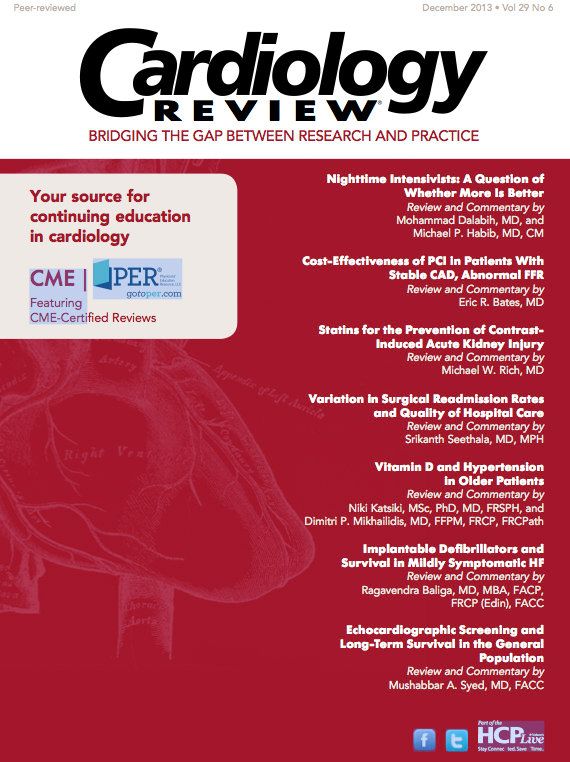Publication
Article
Cardiology Review® Online
News & Trends
TACC Names Hospitals Taking Part in Patient Navigator Program
The American College of Cardiology (ACC) is launching a program that applies a team approach to keeping patients at home and healthy after discharge from the hospital. The ACC Patient Navigator Program was started in response to the increased penalties in effect beginning October 1, 2013, for hospitals with excessive readmission rates within 30 days of discharge for heart attack and heart failure.
The program supports a team of caregivers at selected hospitals to help patients overcome challenges during their hospital stay and in the weeks following discharge, when they are most a risk for readmission.
The ACC Patient Navigator Program will serve as a test for innovative patient-centered solutions to address issues that affect patient health and readmissions, said ACC President John G. Harold, MD, MACC. “These hospitals will serve as pioneers in a new approach to heart disease treatment and care that puts emphasis on meeting patients’ ongoing needs and helping patients make a seamless transition from the hospital to the home.”
Nearly 1 in 5 patients hospitalized with heart attack and 1 in 4 hospitalized with heart failure are readmitted within 30 days of discharge, often for conditions that seem to be unrelated to the original diagnosis, according to the ACC.
The first 11 hospitals participating in the ACC Patient Navigator Program, chosen because of their commitment to quality demonstrated by participation in the National Cardiovascular Data Registry and Hospital to Home program, include:
- Advocate Sherman Hospital, Elgin, IL
- Christiana Care Health Services, Wilmington, DC
- Einstein Medical Center, Philadelphia, PA
- Indiana University Health Methodist Hospital, Indianapolis, IN
- MedStar Washington Hospital Center, Washington, DC
- Providence St. Vincent Medical Center, Portland, OR
- Ronald Reagan UCLA Medical Center, Los Angeles, CA
- St. Mary’s Hospital, Waterbury, CT
- Trident Health, Charleston, SC
- Vanderbilt Heart and Vascular Institute, Nashville, TN
- WakeMed Health and Hospital, Raleigh, NC
AstraZeneca is the founding sponsor of the ACC Patient Navigator Program.
Guidance on Transcatheter Txs for Mitral Regurgitation
Anew overview issued by the American College of Cardiology (ACC), the American Association for Thoracic Surgery (AATS), the Society of Thoracic Surgeons (STS), and the Society for Cardiovascular Angiography and Interventions (SCAI) Foundation states that it is imperative that professional societies, industry, taxpayers, and regulatory agencies collaborate to promote needed research and ensure appropriate integration of transcatheter therapies for the treatment of patients with severe mitral regurgitation (MR).
The societies say that a number of transcatheter therapies for MR are expected to be available for clinical use in the coming years. Therefore, a thoughtful process is needed to ensure that such innovative treatments are introduced into medical practice in the United States with appropriate safeguards.
The overview contains several recommendations for appropriate integration, including the following:
- Further research involving a wider spectrum of patients and devices;
- Continued development of regional heart valve referral centers of excellence that consist of a dedicated, multidisciplinary heart team and dedicated care pathways;
- Required participation of all centers in the ongoing TVT Registry, with limitation of new devices and reimbursement for their application to those centers that meet national criteria;
- Establishment of operator training and credentialing criteria for mitral valve procedures; and
- Creation of guidelines, performance measures, and appropriate use criteria for transcatheter MR interventions.
Visit www.cardiosource.org/en/News-Media/Publications/Cardiology-Magazine/2013/11/New-Societal-Overview-Aims-to-Provide-Guidance-on-Transcatheter-Therapies-for-Mitral-Regurgitation.aspx?print=1 for more information.
Wider Use of Statins Recommended for CKD
Aworking group of the Kidney Disease: Improving Global Outcomes (KDIGO) recommends wider statin use among patients with chronic kidney disease (CKD) and published a synopsis of the key recommendations on lipid management and monitoring in adults with CKD in the December 9, 2013, issue of the Annals of Internal Medicine.
Specific LDL cholesterol treatment targets were removed from the guidelines on managing lipids in patients with CKD, instead basing the decision to start cholesterol-lowering treatment on the absolute risk of coronary events, and evidence that a therapy will help lower that risk.
Marcello Tonelli, MD, of the University of Alberta, Canada, and colleagues present a synopsis of 8 key recommendations in KDIGO’s 2013 practice guidelines.
The key recommendations for statin treatment in patients with CKD include:
- Adults at least 50 years of age who have an estimated glomerular filtration rate (eGFR) less than 60 mL/min/1.73 m2 and who are not treated with chronic dialysis or kidney transplantation should be treated with a statin or a statin with ezetimibe (Level 1A recommendation).
- Adults with dialysis-dependent CKD should not begin treatment with statins or statin/ezetimibe (Level 2A recommendation).
- Patients already taking a statin at the time of dialysis should continue to do so (Level 2C recommendation).
- Kidney transplant patients should receive statin treatment because their risk for coronary events is dramatically increased (Level 2B recommendation).
- Adults age 18 to 49 years who have an eGFR <60 mL/min/1.73 m2 but who are not treated with dialysis or kidney transplantation should be treated with statins if they are known to have coronary disease, diabetes, prior ischemic stroke, or an estimated 10-year incidence of coronary death or nonfatal MI exceeding 10% (Level 2A recommendation).
- Among people with CKD, low-density lipoprotein (LDL) cholesterol is an insufficient test for cardiovascular risk. Adults with newly diagnosed CKD should therefore undergo lipid profile testing (Level 1C recommendation).
- Adults 50 years or older who have CKD and an eGFR 60 mL/min/1.73 m2 or higher should be treated with a statin (Level 1B recommendation).
Some experts are critical of the new recommendations, however, pointing out that except for a single 1A recommendation, they are mostly graded 2B and 2C, and number needed to treat and number needed to harm are not provided.






